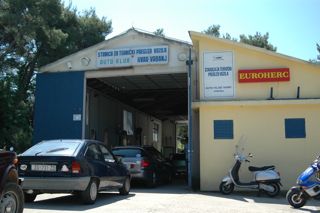
While driving on Hvar might seem something of a challenge, having a car is extremely useful. For those foreign nationals who choose to bring their car over, it’s worth paying attention to local laws. Failure to do so can result in a spot fine. Random checks are frequent on the island, and spare no-one.
You should always have your car documents, driving licence, insurance, plus your passport or identity card to hand. You should also keep your emergency reflective vest near you, not in the boot. The car should be equipped with a warning triangle and first-aid kit. If in doubt about current requirements, contact your nearest Croatian consulate.
The Croatian Automobile Club (HAK) offers information on traffic conditions on its website and on the radio, with foreign language bulletins in the summer months. It gives help in case of breakdown to its members and to holders of the International Assistance Booklet issued by the FIA (Fédération internationale de l’automobile) under the ‘SMARC’ and Category B ‘Snake’ agreements.
For the growing number of foreign nationals staying in Croatia for longer than the three-month tourist visiting period, having a foreign car and driving licence can be a bureaucratic trial. Advice issued by the British Foreign and Commonwealth Office in 2012 warned that: “Your UK driving licence is valid for up to six months from entry into Croatia. If you are staying longer, you need to apply for a Croatian licence. International Driving Licences are not valid in Croatia.” (The 2008 Croatian Road Safety Law had allowed foreign driving licences a year’s grace.)
Applying for a Croatian driving licence to replace a foreign one involves filling in a form at the local police station, and handing over some identity photographs, your foreign licence and a small fee, which is paid at the bank next door. That’s the easy bit, even if the form is in Croatian. The harder part is the compulsory medical test. For this, you have to go to specially accredited clinics, and the nearest ones to Hvar are in Split. The clinics are private, so you have to pay a fee. There is a computerized eye / reaction test, a conversation with a doctor (who has to decide that you’re sane or perhaps mad enough to drive in Croatia), some basic medical tests and – the real challenge – a psychometric test in Croatian which is hard enough for locals to navigate through, never mind foreigners.
 Keeping a foreign car here is even more restricted: you are only allowed three months before you have to re-register your vehicle with Croatian licence plates. That is another lesson in the complexities of Croatian bureaucracy, aka jumping through hoops. First you have to establish if your car is eligible for re-registration – is it too young, too old (seven years maximum), does it conform to Croatian standards? There are all sorts of conditions, not to mention taxes and charges, which may make the whole enterprise impossible to achieve or too expensive to be worthwhile. If you go ahead, you then have to become intimately acquainted with the Vehicle Testing Station in Vrbanj, which fortunately is staffed by some of the friendliest and most efficient people you could hope to find. To follow through, you have to shuttle between Vrbanj and the Police Station in Hvar Town, which is conveniently situated close to the car park. At least the whole process can be completed quickly, largely thanks to the efficiency of the kind people in the Vrbanj Vehicle Testing Centre.
Keeping a foreign car here is even more restricted: you are only allowed three months before you have to re-register your vehicle with Croatian licence plates. That is another lesson in the complexities of Croatian bureaucracy, aka jumping through hoops. First you have to establish if your car is eligible for re-registration – is it too young, too old (seven years maximum), does it conform to Croatian standards? There are all sorts of conditions, not to mention taxes and charges, which may make the whole enterprise impossible to achieve or too expensive to be worthwhile. If you go ahead, you then have to become intimately acquainted with the Vehicle Testing Station in Vrbanj, which fortunately is staffed by some of the friendliest and most efficient people you could hope to find. To follow through, you have to shuttle between Vrbanj and the Police Station in Hvar Town, which is conveniently situated close to the car park. At least the whole process can be completed quickly, largely thanks to the efficiency of the kind people in the Vrbanj Vehicle Testing Centre.
One solution is to buy a car in Croatia, but for that you have to have an address here, plus at least temporary residence. Many get round these requirements by registering their vehicle in the name of a Croatian friend.
Written by Vivian Grisogono







